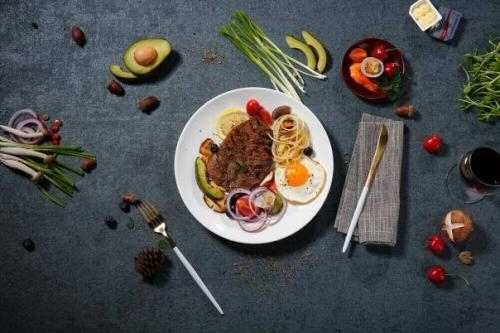When We Eat, or Don’t Eat, May Be Critical for Health
吃什么很重要,什么时候吃也一样
Nutrition scientists have long debated the best diet for optimal health. But now some experts believe that it’s not just what we eat that’s critical for good health, but when we eat it.
长期以来,营养学家们一直在争论对于理想的健康状况而言,最佳的日常饮食是什么。但是如今一些专家认为,重要的不仅仅是吃什么,还有什么时候吃。
A growing body of research suggests that our bodies function optimally when we align our eating patterns with our circadian rhythms. Studies show that chronically disrupting this rhythm – by eating late meals or nibbling on midnight snacks, for example – could be a recipe for weight gain and metabolic trouble.
越来越多的研究表明,当饮食模式与生物钟相匹配时,我们的身体能够以最佳状态运转。长期打乱这种规律,例如吃得很晚或是在深夜吃一点零食,都可能导致体重增加并产生新陈代谢问题。
That is the premise of a new book, “The Circadian Code,” by Satchin Panda, a professor at the Salk Institute and an expert on circadian rhythms research. Dr. Panda argues that people improve their metabolic health when they eat their meals in a daily 8- to 10-hour window, taking their first bite of food in the morning and their last bite early in the evening.
以这样的结论为前提,索尔克研究所教授及人体昼夜节律研究方面专家的萨钦·潘达在新书《节律密码》中提出,把每天的可进食时段控制在8-10个小时之内,即在早晨吃第一顿、傍晚吃最后一顿,有助于提升人们的新陈代谢健康。

This approach, known as early time-restricted feeding, stems from the idea that human metabolism follows a daily rhythm, with our hormones, enzymes and digestive systems primed for food intake in the morning and afternoon. Many people, however, snack and graze from roughly the time they wake up until shortly before they go to bed. Dr. Panda has found in his research that the average person eats over a 15-hour or longer period each day, starting with something like milk and coffee shortly after rising and ending with a glass of wine, a late night meal or a handful of chips, nuts or some other snack shortly before bed.
这一方法也被称为“提早限时进食法”,它源于人类的新陈代谢遵循日常节律,即我们体内的激素水平、酶以及消化系统都更倾向于在早晨和下午进食这一理念。然而很多人大约从早晨醒来一直到睡前都在吃东西。潘达博士在他的研究中发现,平均人们每天在长达15个小时或更长的时段内进食,通常是早晨起来喝一杯牛奶或咖啡,睡前再喝一杯酒、吃顿夜宵,或是一大把薯片、坚果等其他零食。
That pattern of eating, he says, conflicts with our biological rhythms.
潘达教授说,这种饮食模式与我们的生物节律相违背。
Scientists have long known that the human body has a master clock in the brain, located in the hypothalamus, that governs our sleep-wake cycles in response to bright light exposure. A couple of decades ago, researchers discovered that there is not just one clock in the body but a collection of them. Every organ has an internal clock that governs its daily cycle of activity.
科学家们早就发现人类大脑中存在一个主生物钟,它位于下丘脑,能够对亮光进行反馈,从而控制睡眠和清醒的周期。几十年前,研究者们发现人体内存在大量的生物钟,而不是仅有一个。每个器官都有一个内在的生物钟,掌管着它的日常活动周期。
During the day, the pancreas increases its production of the hormone insulin, which controls blood sugar levels, and then slows it down at night. The gut has a clock that regulates the daily ebb and flow of enzymes, the absorption of nutrients and the removal of waste. The communities of trillions of bacteria that comprise the microbiomes in our guts operate on a daily rhythm as well. These daily rhythms are so ingrained that they are programmed in our DNA: Studies show that in every organ, thousands of genes switch on and switch off at roughly the same time every day.
白天,胰腺会增加胰岛素的分泌,用以控制血糖水平,而到了晚上这一过程就会减慢。肠道也有一个生物钟,用以管理每天酶的分泌量的起伏、营养的吸收以及废物的排出。我们肠道内数以亿计的细菌构成的菌群也以日节律运转。这些日节律是如此根深蒂固,以至于它们被写入了我们的基因:研究表明,在每个器官当中,成千上万的基因都在每天大约同一时刻工作和休息。
“We’ve inhabited this planet for thousands of years, and while many things have changed, there has always been one constant: Every single day the sun rises and at night it falls,” Dr. Panda said. “We’re designed to have 24-hour rhythms in our physiology and metabolism. These rhythms exist because, just like our brains need to go to sleep each night to repair, reset and rejuvenate, every organ needs to have down time to repair and reset as well.”
“我们在这个星球上居住了数千年,尽管很多事情发生了变化,但是仍有一件事是永恒的,那就是每天太阳都会照常升起和落下。”潘达教授说。“我们在生理和代谢上被设定好拥有以24小时为周期的节律。这些节律之所以存在,是因为就像我们的大脑每晚需要修复、重启和恢复活力一样,每个器官也需要有休息时间来修复和重启。
英文、中文版本下载:http://www.yingyushijie.com/shop/source/detail/id/891.html








